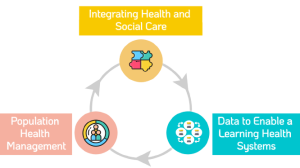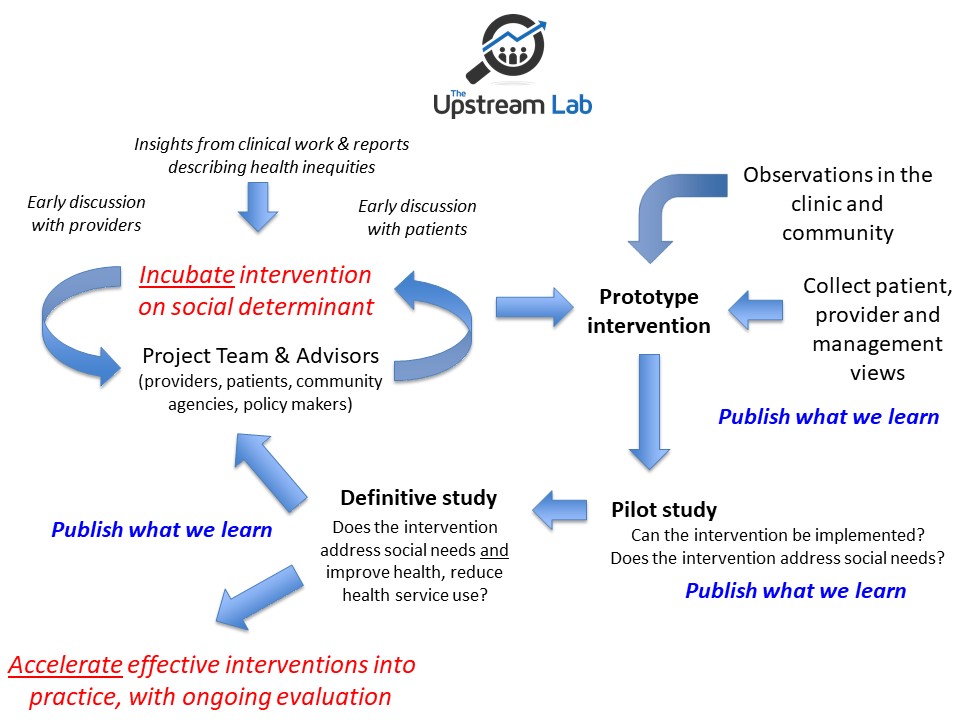Who We Are
About us
Founded by Dr. Andrew Pinto in 2016, the Upstream Lab is the only research group in Canada dedicated to upstream prevention. Our team of scientists, researchers, staff, community advisory members, and trainees have linked initiatives and developed innovative interventions to address social determinants of health. The Upstream Lab has emerged as a leader in integrating health and social care, population health management, using data science to enable proactive care, and conducting trials.
Our Mission
The Upstream Lab is dedicated to:
- Incubating novel interventions that tackle social factors impacting health, in collaboration with patients, health providers, community organizations and policymakers
- Conducting rigorous evaluation of interventions, using a variety of methods
- Sharing our findings widely
- Training and empowering community members to become agents of change


Our Vision
We recognize that the social determinants of health are not only about material needs but also about social justice.
We adopt community-based research principles and work closely with frontline health providers, patients, community and social service agencies, charitable organizations and foundations, advocacy organizations and the government to develop creative interventions to address social determinants.
We view these solutions as complex interventions and hence, any evaluation must be iterative, adaptable to new information and use both qualitative and quantitative data. Our methods are informed by clinical epidemiology, developmental evaluation and realist evaluation.
We also acknowledge the critical roles of broad social, economic, and political factors in enforcing societal hierarchies and contributing to health inequity. Our interventions, therefore, address social determinants of health at multiple levels: individual- or family-level, neighbourhood- or organizational-level, and population- or policy-level.
Our Approach
The Upstream Lab strives to not only examine health inequity through a social justice lens, but also to develop innovative solutions to optimize population health. We are committed to leveraging evidence for concrete actions to effect social change and respond to population and public health challenges.
To facilitate effective transformation of evidence into solutions and to promote continuous learning and improvement in our healthcare system, our research is arranged into three streams:

The objective and approach of some initiatives may be positioned in the intersectionality of multiple streams.
Our Three Research Streams
This stream describes research and interventions that address the social needs of individuals (e.g., housing, income) in healthcare settings, such as primary care clinics or hospitals. It includes the development of screening tools for social needs and other research that explores opportunities for optimizing the role of health services in facilitating social care provision.
Previous projects include screening primary care patients for financial need and connecting them to relevant resources, as well as developing a precarious employment screening tool. Examples of current projects are the SPARK study and a systematic review of food insecurity interventions in health settings.

The second stream is concerned with research and interventions that tackle issues related to social determinants of health at population level. This stream is comprised of initiatives focusing on policy reforms and advocacy, development and evaluations of community- or neighbourhood-level interventions, and studies that aim to improve social infrastructure.
Some examples of projects within this stream include the EMPOWER project which seeks to better understand the work conditions of personal support workers and an initiative to improve access to employment for people living with HIV.
A Learning Health System is a system characterized by rapid adaptation in response to trends detected in public health data and promotes a culture of shared responsibility and synchrony of efforts across the health sectors. It also cultivates public engagement and collaborations across system-level leadership.
Through this stream, our lab aims to utilize both public health data and informatics, particularly Artificial Intelligence (AI) and Big Data, to improve the planning and operations of our health systems. Some projects that belong to this stream include the utilization of AI to predict vulnerable older patients and the development of guidance for patient engagement in AI implementation in healthcare.